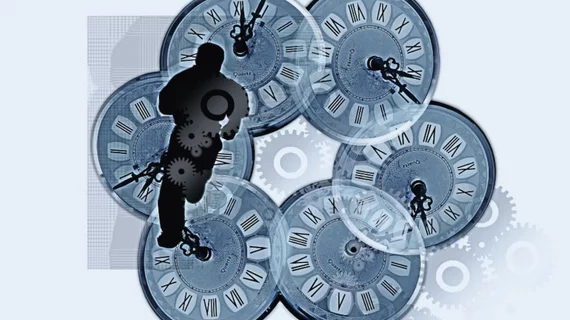Academic radiology chairs are feeling burned out
Burnout is typically characterized by emotional exhaustion, depersonalization and a sense of low personal accomplishment. According to a recent Academic Radiology survey, a large portion of academic radiology department chairs are experiencing at least one or more of these symptoms.
“In addition to poor personal physical and emotional well-being, chair burnout could negatively affect clinical and academic performance leading to decreased productivity and higher error rates,” wrote Dhakshinamoorthy Ganeshan, MD, University of Texas MD Anderson Cancer Center in Houston, and colleagues. “Chair burnout may also result in higher stress and burnout among faculty members in the team contributing to low departmental morale.”
A total of 123 chairs (mean age of 58) were encouraged to complete a 39-question online survey. All were members of the Society of Chairs of Academic Radiology Departments (SCARD) and held an average of nine years of experience in the position. The survey’s design was close to that of other burnout-related studies to better compare and contrast results, the authors noted.
Eighty-seven chairs responded, and 84 percent were men. The group worked an average of 62 hours per week. Four participants met the high burnout criteria mark, achieving high levels of emotional exhaustion, depersonalization and low personal accomplishment. Additional findings are as follows:
- Thirty-eight percent of chairs scored high marks for emotional exhaustion and/or high depersonalization.
- Low professional satisfaction, low work-life balance and low chair effectiveness scores were all associated with high burnout.
- High emotional exhaustion and high depersonalization each correlated with many professional stressors.
- Having no institutional support group and less faculty members were each significantly associated with burnout.
Creating long-term strategies to combat burnout should be a top priority, according to the authors. Physician wellness committees and support groups can each effectively promote well-being for radiology chairs, they added. Programs that help mentor radiology chairs and improve job satisfaction can also help cut into the burnout epidemic.
Overall, the recent “paradigm changes” within healthcare have created an increasingly stressful environment for radiology chairs, Ganeshan et al. noted, and acknowledging the problem is the first step in correcting it.
“It is vital to acknowledge burnout in radiology department chairs,” the authors wrote. “Prompt efforts should be undertaken at the national, institutional, and departmental levels to address burnout in radiology chairs. Further studies evaluating the efficacy of targeted interventions for reducing burnout in the radiology chairs, especially those who may be looking to quit in the near future would be helpful.”

